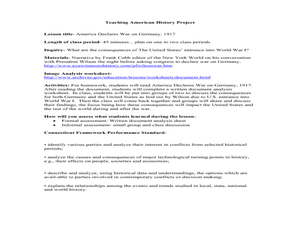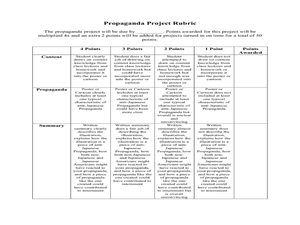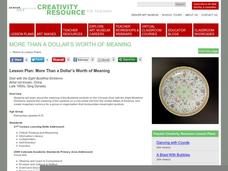PBS
Master of the Airwaves: How FDR Used Radio to Ease the Public’s Fears
The political and economic climate during the 1930's was uncertain and tumultuous. But Americans' minds and hearts were eased with the reassuring words of their president, Franklin D. Roosevelt, and addresses over the radio. High...
Habits of Mind
Haileybury Habits of Mind Learning Resource Book
Imagine a learning community committed to using Costa and Kallick's Habits of Mind as the basis of curriculum design. The resource book is packed with lessons that are designed for and identify the standards and...
Curated OER
World Issues The Millennium Development Goals and Quality of Life
Ninth graders explore quality of life issues in the developing world through the lens of the United Nations Millennium Development Goals. In this World History lesson, 9th graders study the factors necessary to and affecting...
Curated OER
History Repeats Itself
Twelfth graders research historical turning points, gather-data, and extrapolate possible alternate outcomes. They work individually to choose one historical event from Attachment D, Historical Turning Points. Students complete either...
Curated OER
Mapping the New World Lesson Plan
Students compare two maps of the same area from different time periods. In this American History lesson, students look at two maps of the English colonies from 1636 and 1651. They discuss why the maps changed and predict maps from the...
Curated OER
Bridges:Links to History
Seventh graders perform a research project based upon the study of the types of bridges. After preliminary research, student groups will search for four examples of each type located around the world.
Curated OER
America Declares War on Germany, 1917
Young scholars explore the reasons that the United States entered World War I. In this World War I lesson, students read "America Declares War on Germany, 1917," and then discuss the consequences for the U.S. entering the war.
Curated OER
Ancient Mesopotamia
In this geography worksheet, high schoolers read about ancient Mesopotamia and respond to five short answer questions that follow. They identify what part of the country was the heart of Mesopotamia. Then students compare the given map...
Curated OER
Europe Before and after WWI
Eighth graders compare and contrast maps of Europe before and after World War I. In this World War I lesson, 8th graders color and label maps of Europe prior to the war and after it. The historical maps can be accessed online.
Curated OER
American Soldiers’ Experiences During WWI
Students investigate the effects of war on soldiers. In this World War I lesson, students link to the provided Web link to locate primary sources about American soldiers during the war. Students write historical narratives based on their...
Curated OER
Japanese American Internment: Examining Racial Tensions
Young scholars discover how racial tension led to Japanese Internment. In this World War II lesson, students analyze political cartoons and posters related to the movement of Japanese-Americans to internment camps in the wake of the...
Curated OER
Christmas in the Trenches, 1914
Students investigate the role of Trench Warfare in World War I. For this World War I lesson, students read Christmas in the Trenches, 1914 and then discuss the conditions of war in trenches and how Christmas 1914 interrupted the war....
Curated OER
Worksheet 4. Predictions
In this predictions worksheet, students read 6 predictions that were made in history and identify each of them as true or false. Idioms and words are defined at the bottom of the sheet.
Curated OER
The Holocaust
Eighth graders consider how something like the Holocaust could happen. In this Holocaust activity, 8th graders analyze German propaganda that was used to garner support for World War II. Students discuss which pieces of propaganda were...
Curated OER
Arthur: The Once And Future King
Middle and high schoolers work in groups to research tales of King Arthur, using primary sources. They present the major themes and symbols from these stories, and discuss how they still relevant in today's world. Use this lesson to...
Curated OER
Battle of The Pantheons
Students will investigate the Greek Mythology of gods and goddesses. This is a large unit and a mind map will be developed. An essential question will be answered to encourage students to develop higher thinking skills.
NOAA
History's Thermometers
How is sea coral like a thermometer? Part three of a six-part series from NOAA describes how oceanographers can use coral growth to estimate water temperature over time. Life science pupils manipulate data to determine the age of corals...
VT FEED
The Origins of Civilization and Agriculture: Integrating the Study of Food
What role has food played in the rise and changing nature of civilizations? Here you'll find a fantastic set of lessons and materials on such topics as where food is grown in the United States, the food of ancient peoples,...
Population Education
Population Map
Here is a very interesting graphic of a world map where each country's size is adjusted accordingly to its population. The bottom row of the document also includes several maps depicting the major shifts and growth of the world...
US Institute of Peace
What Does It Take to be a Peacebuilder?
In a world of conflict, choose to be a peacebuilder. Young scholars research a chosen peacebuilder from the past or present before creating a billboard project with that person's name, accomplishments, and prominent quotes.
Curated OER
Instruments From Around the World
How much does the environment affect how and what man creates? Children explore the effect of the environment on primitive man as they research raw materials from a specific location. They use their findings to write a short essay about...
Curated OER
Lesson: More Than a Dollar's Worth of Meaning
The Chinese, Dish with the Eight Buddhist Emblems contains symbols and visual references for learners to explore. They search for Buddhist symbolism on the dish and then they use their observation skills to locate and explore...
Curated OER
Raising Voices: World War II in a Song
Twelfth graders discover the different ways Canada and Quebec participated in World War II. They then analyze the repercussions of the war on Quebec. Students complete three knowledge outcomes: Knowledge of facts, ( Canada's...
Curated OER
Studies of the Eastern Worlds: Historical Summaries
Seventh graders interpret their own meaning of the painting, "Christ's Descent into Hell" by Hieronymus Bosch and the song "We Didn't Start the Fire" by Billy Joel. They focus on the chaos created in both the art and music and discuss...























